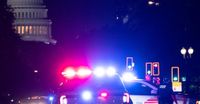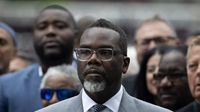As the nation prepared for Labor Day weekend, a fierce debate over federal intervention in city crime reached a boiling point. President Trump, emboldened by his administration’s recent crackdown in Washington, D.C., signaled a willingness to expand aggressive law enforcement tactics to other Democratic-run cities, with Chicago in the immediate crosshairs. The move has drawn both praise and criticism, igniting partisan conflict and raising questions about the long-term effectiveness of such strategies.
On August 31, 2025, Homeland Security Secretary Kristi Noem announced plans to "add more resources" to federal law enforcement operations in Chicago, echoing the administration’s tough stance on crime. "We’ve already had ongoing operations with ICE in Chicago and throughout Illinois and other states, making sure that we’re upholding our laws. But we do intend to add more resources to those operations," Noem said during an appearance on CBS’s Face the Nation, according to Nexstar Media. When pressed about the possibility of similar interventions in other cities, Noem made it clear that "all options remain on the table," adding, "We haven’t taken anything off the table. We’ve been making sure that we have the resources and the equipment to go in."
This assertive federal approach follows a violent weekend in Chicago, where, as President Trump noted on his social media platform Truth Social, "Six people were killed, and 24 people were shot, in Chicago last weekend." Trump’s post directly challenged Illinois Governor JB Pritzker, warning, "He better straighten it out, FAST, or we’re coming!" The president’s rhetoric has further inflamed tensions between federal and local authorities, with Chicago Mayor Brandon Johnson responding forcefully. On August 30, Johnson signed an executive order opposing what he called "an unconstitutional and illegal military occupation of our city," vowing, "The City of Chicago will do everything in our power to defend our democracy and protect our communities."
The flashpoint for this national debate was Washington, D.C., where Trump’s deployment of hundreds of National Guard troops and federal agents earlier in August was quickly followed by a reported drop in crime. Attorney General Pam Bondi released updated figures ahead of Labor Day: from August 7 to August 30, there were 1,452 arrests and 151 illegal guns seized in the capital. More than 80 arrests and 11 illegal firearms seizures occurred on the night of August 29 alone. "This Labor Day weekend, our nation’s capital is a safer place thanks to our DC and Federal law enforcement partners," Bondi wrote on X (formerly Twitter), as reported by 7News.
President Trump has been quick to tout these results as proof of his approach’s success, declaring on social media, "DC is virtually, in just 14 days, a CRIME FREE ZONE. The people living and working there are ecstatic!!!" Yet, for many local officials and crime experts, the story is far from settled. They argue that such surges are, at best, short-term fixes. Thomas Abt, director of the Center for the Study and Practice of Violence Reduction, explained to The New York Times, "The reason that surges are not particularly effective, and are generally disfavored by crime researchers and others who look at this stuff for a living, is because it’s a resource-intensive way of temporarily reducing crime. If it does in fact reduce crime, that doesn’t address any of the underlying conditions."
Indeed, local elected officials in Washington have called Trump’s deployment of the National Guard a "power grab," and point out that leaving troops on the ground indefinitely is unsustainable. Many experts suggest that if the federal government truly wants to help cities, it should focus on long-term solutions, such as funding for police training, recruitment, and crime prevention programs. The president himself has floated a $2 billion project to "beautify" Washington—fixing sidewalks, improving parks, and adding streetlights. Surprisingly, researchers note that such urban improvements can have a real impact on reducing crime, as well-lit public spaces and community gathering areas deter violence and promote social cohesion. Jens Ludwig, director of the University of Chicago Crime Lab, remarked, "Just because Trump proposes it does not mean that it is necessarily a bad idea and a contradiction of evidence."
However, critics warn that the administration’s cuts to community violence prevention groups and policing grants could undermine any gains. Chicago Mayor Brandon Johnson has argued that if the federal government truly wanted to help, it would restore funding for local violence prevention groups, which mediate disputes, mentor at-risk youths, and provide mental health support. "There are many things the federal government could do to help us reduce crime and violence in Chicago, but sending in the military is not one of them," Johnson stated, as cited by The New York Times.
On Capitol Hill, the political battle is intensifying. House Republicans, responding to Trump’s call for a "comprehensive crime bill," are preparing legislation aimed at issues like cashless bail and giving the president more explicit authority to deploy the National Guard in major cities. Speaker Mike Johnson and Senate Majority Leader John Thune are said to be working closely with the president, though the bill’s details remain under wraps. The House Oversight and Government Reform Committee is scheduled to hold a hearing on September 18 with D.C. Mayor Muriel Bowser and other city officials to examine crime in the capital. Meanwhile, Congress faces a deadline of September 10 to extend Trump’s emergency control of the D.C. police force—a move likely to face stiff resistance in the Senate, where Democratic Leader Chuck Schumer has flatly rejected any extension of Trump’s emergency declaration.
Some Republican lawmakers, including Sen. Mike Lee of Utah, have called for even more dramatic measures, such as repealing D.C.’s Home Rule Act and "federalizing" the nation’s capital. Others, like Sen. Roger Marshall of Kansas, have lauded Trump’s actions, saying, "I’m just saluting President Trump. More power to him to do whatever it takes to secure our nation’s capital."
Yet, the debate over the best way to tackle city crime is far from settled. Experts like David M. Kennedy, a criminologist at John Jay College of Criminal Justice, advocate for "focused deterrence" strategies that target the small number of individuals and locations responsible for most violence, rather than broad, military-style deployments. "Everything in crime strategy is about focus on the people and places that drive crime," said Adam Gelb, president of the Council on Criminal Justice.
As the administration signals its intent to expand federal crackdowns to cities like Chicago, the nation finds itself at a crossroads—torn between calls for swift, forceful action and appeals for deeper, more sustainable reforms. For now, the only certainty is that the debate will continue to shape American politics and urban life well beyond this holiday weekend.


